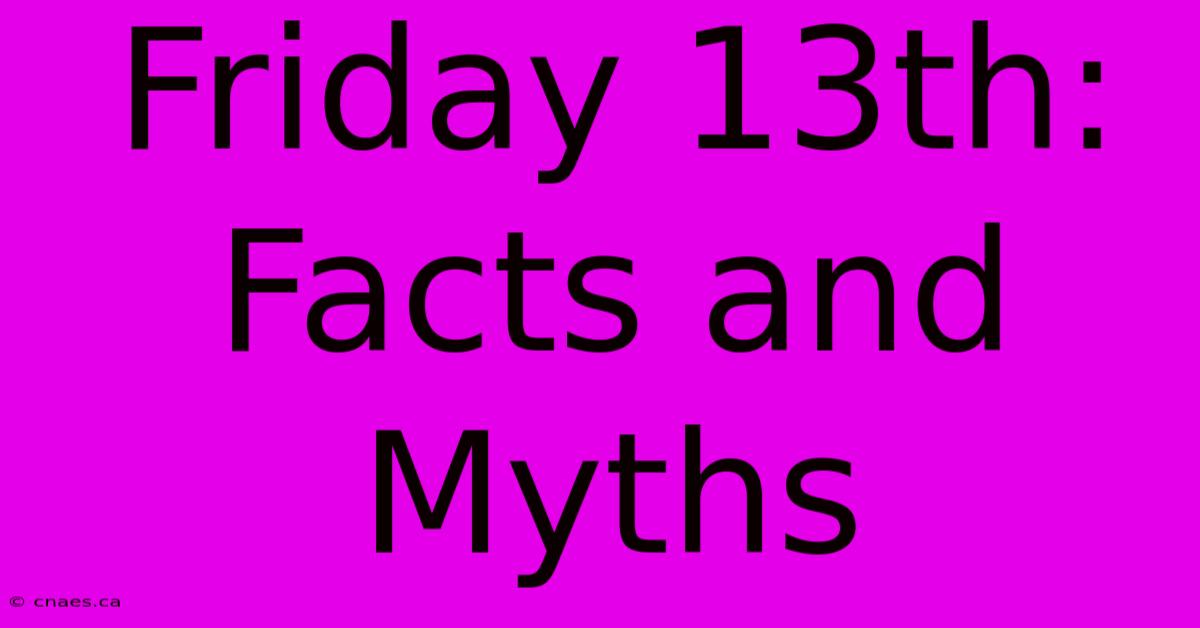Friday 13th: Facts And Myths

Discover more detailed and exciting information on our website. Click the link below to start your adventure: Visit My Website. Don't miss out!
Table of Contents
Friday the 13th: Facts and Myths
Friday the 13th. Just the phrase conjures images of black cats, broken mirrors, and unfortunate events. But is this widespread superstition rooted in fact, or is it simply a case of collective anxiety? Let's delve into the fascinating history and explore the truth behind the myths surrounding Friday the 13th.
The History of Friday the 13th: Unraveling the Superstition
The fear of Friday the 13th, known as friggatriskaidekaphobia, has a surprisingly long and complex history. While the exact origins remain debated, several theories attempt to explain its persistence.
Biblical and Pagan Influences
Some trace the origins back to the Last Supper, where 13 people were present before the betrayal and crucifixion of Jesus. The number 13 itself has been associated with misfortune in various cultures throughout history. Friday, often linked to the crucifixion, further contributes to the negative connotations.
The Knights Templar and Friday the 13th
Another compelling theory points to the persecution of the Knights Templar in 1307. King Philip IV of France, deeply in debt to the Templars, ordered their arrest on Friday, October 13th. This event, steeped in betrayal and violence, may have solidified the negative association with the day.
Debunking the Myths: Is Friday the 13th Really Unlucky?
While the historical context provides a fascinating background, there's no scientific evidence to support the claim that Friday the 13th is inherently more unlucky than any other day. Statistical studies have repeatedly shown no significant increase in accidents or negative events on these days.
The Power of Suggestion: The Placebo Effect of Fear
The perceived unluckiness of Friday the 13th is likely a self-fulfilling prophecy. The widespread belief itself can influence behavior. People may be more cautious, leading to fewer risky actions, but this isn't a result of inherent bad luck. This is a powerful example of the placebo effect, but in reverse; it's a nocebo effect, where negative expectations lead to negative outcomes.
The Psychology of Superstition
Our brains are wired to seek patterns, even where none exist. The human tendency to create narratives and connect unrelated events plays a crucial role in perpetuating superstitions. When something negative happens on a Friday the 13th, it's easily remembered and reinforces the pre-existing belief.
Embracing the Friday the 13th Phenomenon
Rather than fearing Friday the 13th, we can view it as a fascinating example of the power of collective belief and the human psyche. It highlights the enduring influence of historical events and cultural narratives on our perceptions of the world.
Friday the 13th and Popular Culture
The enduring appeal of Friday the 13th is evident in its prevalence in popular culture. Numerous films, books, and television shows have capitalized on the spooky connotations, transforming the superstition into a commercially successful theme.
Turning a Superstition into an Opportunity
Instead of letting fear dictate your actions, consider embracing the day with a sense of humor. Use it as a conversation starter, explore the history behind the myth, or simply enjoy the slightly spooky atmosphere.
Conclusion: Fact vs. Fiction
In conclusion, while the historical origins of the Friday the 13th superstition are intriguing, there's no scientific basis for the belief that it's inherently unlucky. The phenomenon serves as a compelling example of how cultural beliefs, historical events, and psychological biases can shape our perceptions and experiences. So, the next time Friday the 13th rolls around, remember the history, appreciate the cultural impact, and choose to focus on the positive aspects of your day.

Thank you for visiting our website wich cover about Friday 13th: Facts And Myths. We hope the information provided has been useful to you. Feel free to contact us if you have any questions or need further assistance. See you next time and dont miss to bookmark.
Also read the following articles
| Article Title | Date |
|---|---|
| Canada Approves Novel Plant Omega 3s | Dec 13, 2024 |
| Dhanushs Birthday Message For Rajini | Dec 13, 2024 |
| Seales Faith Figures And Pride | Dec 13, 2024 |
| Pedro To Liverpool Gossip | Dec 13, 2024 |
| Wi Secure Series Enhanced Protection | Dec 13, 2024 |
